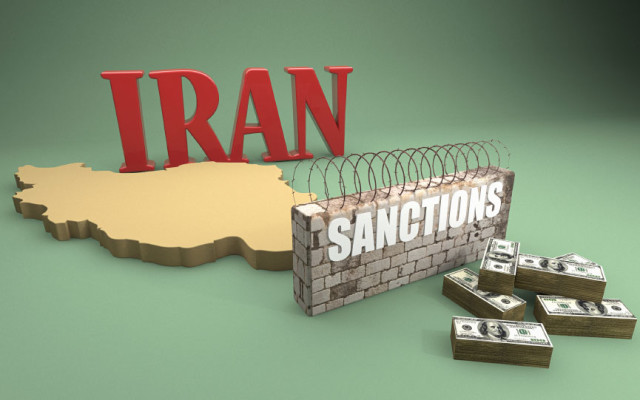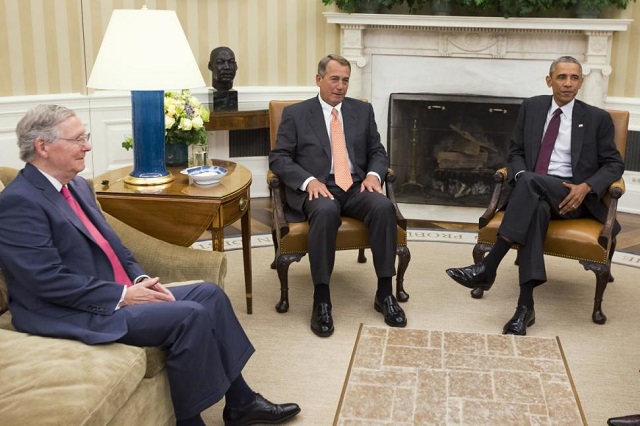 Where there were five undeclared Democrat Senators on the cusp of reconvening Congress, today there is only one, Ms. Cantwell from Washington State. Three Democrat Senators: Richard Blumenthal of Connecticut, Ron Wyden of Oregon and Gary Price of Michigan declared for the President’s position. Two of the three Democrat Senators who declared for the President position, Blumenthal and Wyden are up for re-election in 2016, while Price is not. The lone Democrat who joined with the Republican majority to oppose the Iran Pact is West Virginia Senator, Joe Manchin.
Where there were five undeclared Democrat Senators on the cusp of reconvening Congress, today there is only one, Ms. Cantwell from Washington State. Three Democrat Senators: Richard Blumenthal of Connecticut, Ron Wyden of Oregon and Gary Price of Michigan declared for the President’s position. Two of the three Democrat Senators who declared for the President position, Blumenthal and Wyden are up for re-election in 2016, while Price is not. The lone Democrat who joined with the Republican majority to oppose the Iran Pact is West Virginia Senator, Joe Manchin.
In a statement released by his office, Manchin said, “I believe that to be a super power, you must possess super diplomatic skills, and I believe that we can use these skills to negotiate a better deal.”
That leaves possibly 58 Senators, 54 Republicans and four Democrats opposing the Iran nuclear pact. That is two shy of the required 60 votes for cloture under the current Senate Rule 22 to cut off a filibuster. A vote on the majority resolutions rejecting the Iran pact could be scheduled as early as Thursday. That is, if the promised filibuster led by Senator Minority Democrat Leader Reid doesn’t stop the vote first.
Reid unleashed the filibuster option on Saturday, September 5th. White House Spokesperson Josh Earnest said Tuesday, September 8th:
It would be a little ironic for now Majority Leader Mitch McConnell to express concerns about a tactic that he, himself, employed on countless occasions. The other thing that I’ll point out is that the 60 vote threshold is actually one that was approved by the 98 senators who voted for the Corker-Cardin legislation back in the spring.
Opponents of the Iran nuclear pact circulated a letter on Capitol Hill today signed by 15 governors including four Republican hopefuls; Jindal of Louisiana, Christie of New Jersey, Kasich of Ohio and Walker of Wisconsin. Republican majority and other opponents of the filibuster floor maneuver by minority Democrats criticize it for denying an up or down vote on the measure that Americans in leading polls taken by a 2 to 1 margin have urged Congress to reject the Iran deal. Harvard law professor emeritus, Alan Dershowitz, author of The Case Against the Iran Deal said in a Steve Malzberg Show interview on NewsMax TV, September 3, 2015:
As an opponent of the deal, a filibuster would be a good result because it would deny legitimacy to the deal. The American public is not going to accept a deal that was filibustered. Let’s remember what a filibuster is. It was a southern strategy designed to undo democracy and to offend equality.
Dershowitz drew attention to the quandary that Israel and PM Netanyahu would face if the Iran pact was approved:
I know Benjamin Netanyahu. I’ve known him since 1973. He is not going to sit back and allow Iran to develop nuclear weapons.
This deal makes it much harder for Israel to defend its people.
In a Washington Post opinion article by Rep. Mike Pompeo (R-KS), member of the House Permanent Intelligence Committee, and Constitutional lawyer, David B. Rivkin, Jr. Senior Fellow at the Foundation for Defense of Democracies argued that the failure to deliver a side deal might void the Iran pact. Further they raised the prospect of possible litigation against the President on the grounds that the he didn’t deliver the requisite information. They were especially concerned about the IAEA side agreements with Iran to prepare a Road Map on prior military developments. Aversion of which was leaked with provisions for self inspection at the military site of Parchin, Iran. That Road Map is a condition for release of $100 billion in sequestered funds held by US and foreign financial institutions. Switzerland has already released their sanctions and Russia and China are poised to release their holdings. The EU3 component of the P5+1 are already in discussions with Tehran over billions of trade deals preventing a possible snap back of sanctions should Iran be found cheating on a sneak out to a nuclear weapon. A weapon that some believe it may already have and be able to possibly via a satellite launch.
The Pompeo- Rivkin Washington Post opinion was earlier supported by Jerome Marcus, Esq. in a Wall Street Journal opinion piece, “An Informed Vote on the Iran Deal.” Marcus suggested based on his experience as a young lawyer assisting former State Department counsel, Abraham Sofaer in the Reagan era, executive agreements like JCPOA with far reaching implications should be treated as if it was a treaty. Marcus concluded:
The lesson for today is clear: When a legislative body is deciding whether to approve an international agreement, especially one as important as the recent nuclear agreement with Iran, its members have the right to access the agreement’s negotiating record. Members of Congress should demand that record now, and they should examine it, before they cast their votes.
To bring such a suit Dr. Robert B. Sklaroff and Lee S. Bender, Esq. suggested in a FrontpageMagazine article that the Senate Majority Leader, McConnell should undertake the following steps:
Emergency Prescription for Senate: [1]—Pass rule that abolishes the filibuster; [2]—Pass resolution declaring the Iran nuke deal to be a “treaty”; [3]—Defeat the deal; and [4]—Sue President Obama to enjoin him from implementing the deal.
The procedures for initiating the first critical step, achieving cloture cutting off the threatened filibuster, are contained in two relevant Congressional Research Service reports; Considerations for Changes in Senate Rules by Richard S. Beth, January 2013 and Filibusters and Cloture by Beth and Valerie Heitschusen, December 2014.
Sklaroff heard Dershowitz at a presentation in Cherry Hill, New Jersey on September 2nd. He reported on Dershowitz’s remarks and response:
On September 2, Dershowitz, at the Jewish Community Center in Cherry Hill, N.J., amplified on this viewpoint, quoting Federalist 64: “The power of making treaties is an important one, especially as it relates to war, peace, and commerce; and it should not be delegated but in such a mode, and with such precautions, as will afford the highest security that it will be exercised by men the best qualified for the purpose, and in the manner most conducive to the public good.”
When I [discussed] with him the necessity to sue Obama, he initially raised concern that this would be discarded as a “political question.” “Who would sue?” he asked rhetorically. “Senator McConnell!” said I. “Well, it’s a possibility, because he would have standing, representing the Senate.”
Has such a suit been brought by the Senate against President Obama and the Supreme Court ruled on the matter of executive overreach of lawful authorities? There is the example of the Supreme Court June 2014 unanimous ruling against the President for his three day recess appointment of National Labor Relations Board and Consumer Protection officials in 2012 that required approval by the Senate. The original matter was brought by a Washington State bottler and a decision rendered in the DC US Circuit Court of Appeals by Judge David B. Sentelle. Note the comments of the Republican Counsel for the Senate and then Senate Majority Leader Reid from a Washington Post article:
Miguel Estrada, who represented Senate Republicans in the case, called the ruling a victory for the Senate. “The Supreme Court reaffirmed the Senate’s power to prescribe its own rules, including the right to determine for itself when it is in session, and rejected the President’s completely unprecedented assertion of unilateral appointment power,” he said.
But Senate Majority Leader Harry M. Reid (D-Nev.) blamed Senate Republicans for denying nominees a chance to be confirmed through a vote of the full chamber. “President Obama did the right thing when he made these appointments on behalf of American workers.”
Tomorrow, September 9, 2015, Democrat Presidential front runner Hillary Clinton former Secretary of State, embroiled in a private email server controversy, will make the case for support of the President’s position. She has previously gone on record saying:
The Europeans, the Russians, the Chinese, they’re gonna say we agreed with the Americans, I guess their president can’t make foreign policy. That’s a very bad signal to send.
Clinton will be a minor distraction from the Tea Party Patriots (TPP) Stop Iran Now Rally chaired by Jenny Beth Martin on the West Lawn of the US Capitol Building with a cast of media luminaries in the opposition camp. The event is co-sponsored by TPP, Zionist Organization of America and the Center for Security Policy. The roster of those speaking includes TPP head Martin, Republican Presidential front runner Donald Trump, fellow Presidential hopeful Ted Cruz (R-TX), Conservative talk show Hosts Glen Beck and Mark Levin, David Bossie of Citizens United, Rep. Trent Franks (R-AZ), Chairman of the Congressional Israel Allies Caucus, former CIA-director, Ambassador R. James Woolsey, Chairman of the FDD, Frank Gaffney of the CSP, Sarah Stern of EMET and Mort Klein of the ZoA. This will be a media spectacle.
Late this afternoon, my colleague at 1330amWEBY Mike Bates, host of “Your Turn”, and I reviewed these developments. Listen to the WEBY audio segment here. Bates observed that the motivation behind these political maneuverings was President Obama’s objective all along to bolster Iran’s position in the Middle East as a recognized nuclear threshold state threatening traditional support for Allies in the region, Israel, Saudi Arabia, the Emirates and Egypt. Bates thought the Reid filibuster play was simply a travesty of politics as usual in Washington. In turn we both discussed the strange case of Florida US. Representative and Democratic National Committee head, Debbie Wasserman-Shultz, who has infuriated segments of her large but divided Jewish constituency. In her public statement she said tearfully that from her “Jewish heart” the Iran pact, as defective as it is, was the correct thing to do. We concurred that the filibuster if not upended by a Republican cloture to force an up or down vote would enable her and other Democrat colleagues up for re-election in 2016 to claim that there was never a vote. Political cover that comes at a high price of Iran receiving tens of billions now with promises of trillions in economic trade benefits. All while harboring secret development of nuclear weapons threatening the U.S. and Israel.
RELATED ARTICLES:
How Many U.S. Troops Were Killed By Iranian IEDs in Iraq?
Iran Could Outsource Its Nuclear Program to North Korea
EDITORS NOTE: This column originally appeared in the New English Review.






 David B. Rivkin, Jr., Esq.
David B. Rivkin, Jr., Esq.
 Where there were five undeclared Democrat Senators on the cusp of reconvening Congress, today there is only one, Ms. Cantwell from Washington State.
Where there were five undeclared Democrat Senators on the cusp of reconvening Congress, today there is only one, Ms. Cantwell from Washington State.